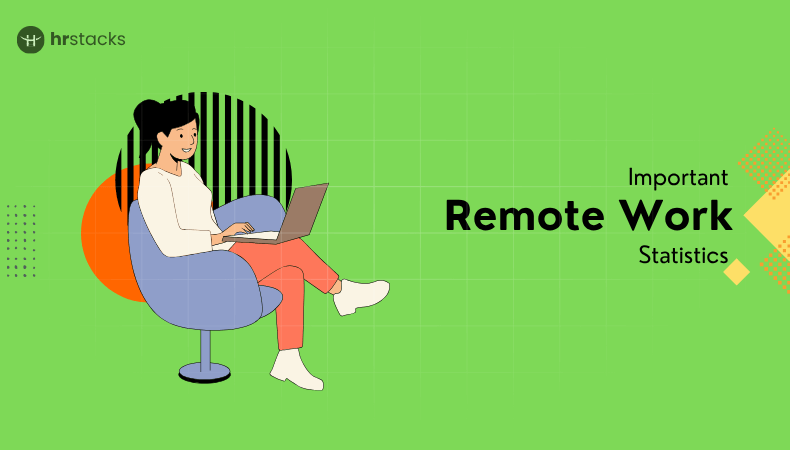Expanding your SaaS company globally? Managing payroll, taxes, benefits, and compliance across multiple countries can quickly become overwhelming. That’s why many SaaS businesses turn to Employer of Record (EOR) providers for fast, compliant, and cost-effective international hiring.
In this guide, we compare top EOR platforms, including Deel, Remote, Papaya Global, Multiplier, Rippling, Oyster, and others, highlighting their strengths, limitations, pricing models, and ideal use cases for SaaS companies aiming to scale globally.
How to Choose the Right EOR Platform for SaaS Growth?
To identify platforms best suited for SaaS companies, a rigorous set of criteria grounded in industry best practices has been used:
1. Global Coverage & Owned Entity Model
We verified whether providers operate via their legal entities (direct model) or through partners, and if they cover regions key to SaaS expansion. Providers with owned entities typically offer tighter compliance and smoother onboarding.
2. Legal Compliance & Local Expertise
Evaluated the provider’s knowledge of local labor laws, tax rules, data protection, contract administration, and termination policies. We also looked for proactive compliance frameworks to mitigate risk.
3. Technology, Integrations & API Support
Assessed platform usability, dashboards, API capabilities, compatibility with HRIS/payroll systems, and reporting tools. Modern, secure systems accelerate workflows and improve transparency.
4. Transparent Pricing & Hidden Costs
Examined pricing models (per-employee fees vs payroll percentage) and checked for hidden costs like FX fees, onboarding, and termination charges. Transparency in costs is essential for scaling predictably.
5. Customer Support & Onboarding Speed
Reviewed SLA terms, account management quality, onboarding speed, and responsiveness to employee queries, especially across jurisdictions.
6. Market Reputation & Client Reviews
Studied client use cases, industry case studies, employee reviews, and provider tenure in the market. Longevity and positive feedback signaled reliability.
Comparison of Top EOR Platforms for SaaS
To support seamless global hiring without setting up local entities, many SaaS companies rely on Employer of Record (EOR) services to manage payroll, compliance, benefits, and taxes across different countries.
After evaluating over 40 platforms and reviewing user feedback, reviews, and real-world use cases, it’s clear that solutions like Deel, Remote, Papaya Global, Rippling, Oyster, Multiplier, Globalization Partners (G‑P), and Skuad consistently lead the pack thanks to their coverage, integration capabilities, and compliance support.
Deel – Best for Fast-Scaling SaaS Teams
Deel is a global employment platform that helps SaaS companies hire employees and contractors in over 150 countries. It combines owned-entity infrastructure with fast onboarding, multi-currency payroll, and modern HR integrations, making it ideal for fast-growing teams expanding across multiple regions.
- Operates via owned local entities in ~150 countries and in-house payroll teams in 70+, ensuring compliance and control.
- Offers unified HR, contractor, and payroll workflows with crypto payouts, global contract templates, equity handling, and immigration support.
- Frequently rated 4.8/5 on G2 by SaaS businesses for ease of use, speed of onboarding, and automation .
Considerations: Pricing may be steep for smaller startups; support at high scale may vary.

Remote – Best for Compliance-First SaaS Hiring
Remote offers a compliance-driven Employer of Record solution designed to simplify hiring in 150 countries. With transparent pricing, owned legal entities, and strong data protection protocols, it’s built for SaaS businesses prioritizing legal security and operational control.
- Runs its own EOR infrastructure in 150+ countries, prioritizing legal and tax compliance.
- Praised for transparent fee schedules and contractor/employee coverage across global jurisdictions.
- Strong integration support and multi-currency payroll make onboarding seamless.
Considerations: Live legal support and deeper customisation for benefits may require upgrades.

Rippling – Best for Unified HR, IT & Payroll
Rippling blends EOR services with IT management, payroll, and HR automation on a single platform. SaaS companies can manage global hiring, device provisioning, app access, and payroll from one dashboard, streamlining operations across tech and HR functions.
- Combines EOR with device management, software provisioning, and HR automation on one platform.
- Highly rated (4.8/5) by SaaS teams for unified admin workflows and intuitive interface .
Considerations: Coverage is limited to 50 countries—best suited to SaaS teams focused on markets with strong IT‑HR overlap.

Globalization Partners (G‑P) – Best for Enterprise SaaS Expansion
G‑P offers enterprise-level global employment solutions across 180+ countries through its owned entities and proprietary G‑P Meridian platform. Its AI-driven compliance tools and premium support make it suitable for SaaS enterprises managing large-scale international teams.
- Operates in 180+ countries via the G‑P Meridian Suite using fully owned entities.
- Offers AI‑powered guidance (GIA) on local hiring laws, benefits, and tax implications.
- Holds high G2 satisfaction scores (around 4.4+), particularly praised by mid‑market and enterprise SaaS companies.
Considerations: Premium pricing; may be overkill for small startups or early-stage teams.
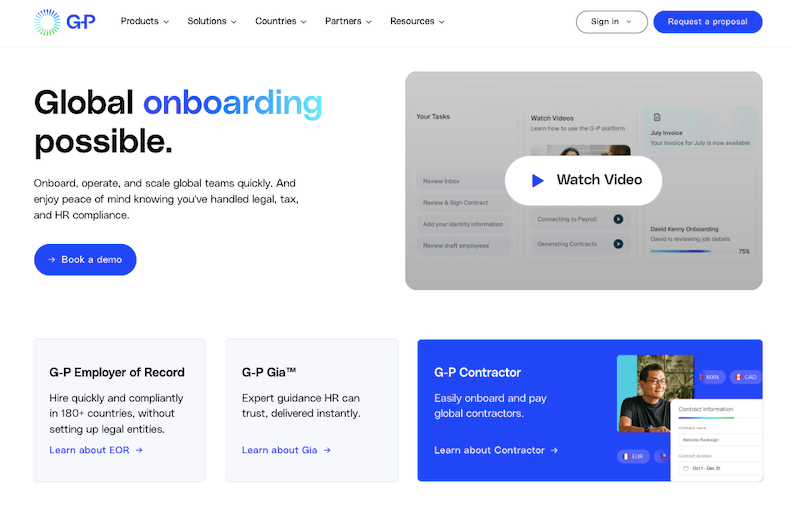
Oyster HR – Best for Remote-First SaaS Teams
Oyster specializes in automating global hiring and onboarding for remote-first SaaS companies. Supporting 180 countries, it offers self-serve contract generation, automated compliance resources, and streamlined payroll for distributed teams.
- Serves 180 countries; emphasizes async, automated onboarding and contract generation .
- Offers clear contract templates, multi-currency payroll, and proactive compliance libraries.
- Rated around 4.4/5 by software teams for ease of use and admin automation.
Considerations: Limited live legal advisory; lacks an integrated PEO model.

Multiplier – Best for Emerging Markets Expansion
Multiplier focuses on simplifying international hiring in emerging markets like Asia, MENA, and LATAM. With transparent pricing and fast employee onboarding, it’s designed for SaaS startups looking to scale into growth regions without heavy infrastructure.
- Coverage includes 150+ countries, with particular strength in Asia, MENA, and LATAM.
- Transparent pricing (~US$400–450 per full-time employee/month) .
- Onboarding is fast, often under 24 hours, and supports both contractors and employees flexibly.
Considerations: Feature set is more basic; not ideal for enterprise-level analytics or heavy automations.
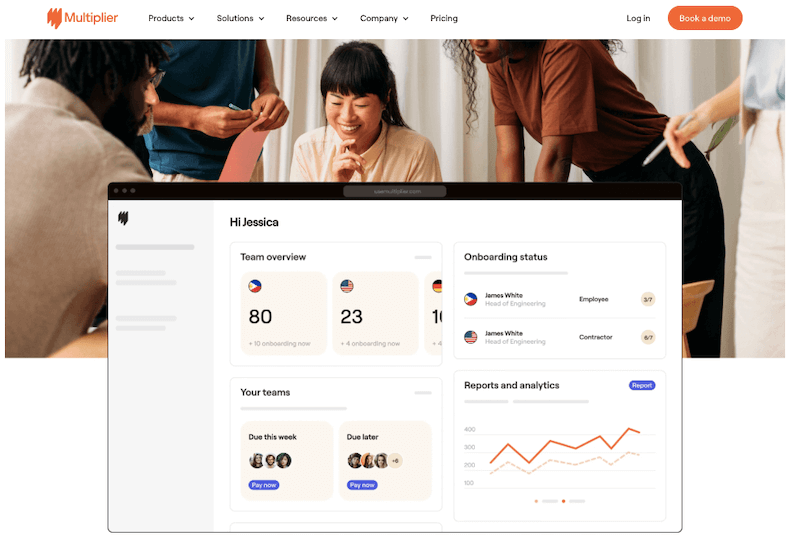
Skuad – Best for APAC, MENA, LATAM SaaS Hiring
Skuad helps SaaS companies hire talent in 160 countries, with deep expertise in emerging regions. It offers payroll, benefits, and compliance management through a simple platform tailored to startups and mid-size SaaS firms entering APAC, Africa, and MENA markets.
- Offers payroll and compliance in 160 countries; excels in emerging tech hubs .
- G2 reviews highlight ease of use (rated 9.4/10), robust local support, and multi-currency payments.
Considerations: Less suited for Western‑first SaaS scaling; fewer enterprise-level API integrations.
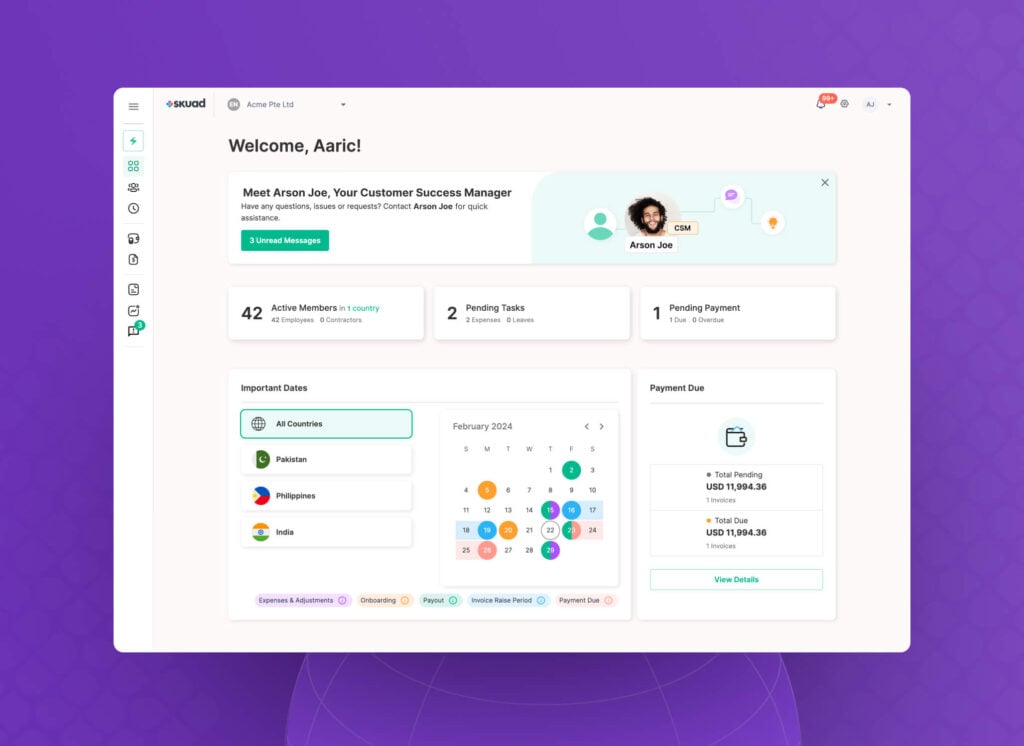
Papaya Global – Best for Payroll Analytics & Finance Integration
Papaya Global combines EOR services with advanced payroll and finance tools, supporting over 160 countries. It’s designed for SaaS firms that need detailed workforce analytics, treasury support, and integrated finance workflows alongside standard EOR capabilities.
- A fintech‑SaaS hybrid platform supporting Employer‑of‑Record and payroll across 160+ countries.
- Provides deep analytics dashboards, treasury services, equity/payroll harmonisation, and AI–powered anomaly detection.
Considerations: Learning curve may be steep; higher cost for smaller teams.

Velocity Global – Best for Flexible Global Scaling
Velocity Global combines Employer of Record services with global payroll and compliance support across 185+ countries. It offers flexibility for SaaS companies scaling into multiple regions without heavy infrastructure, thanks to a mix of owned entities and partner networks.
- Operates in 185+ countries using a hybrid owned-entity and partner model.
- Offers integrated EOR, Agent of Record (AOR), and global contractor solutions.
- Known for scalable onboarding, flexible employment models, and responsive support.
Considerations: Hybrid entity model may result in variable compliance control across regions; pricing is typically customized.
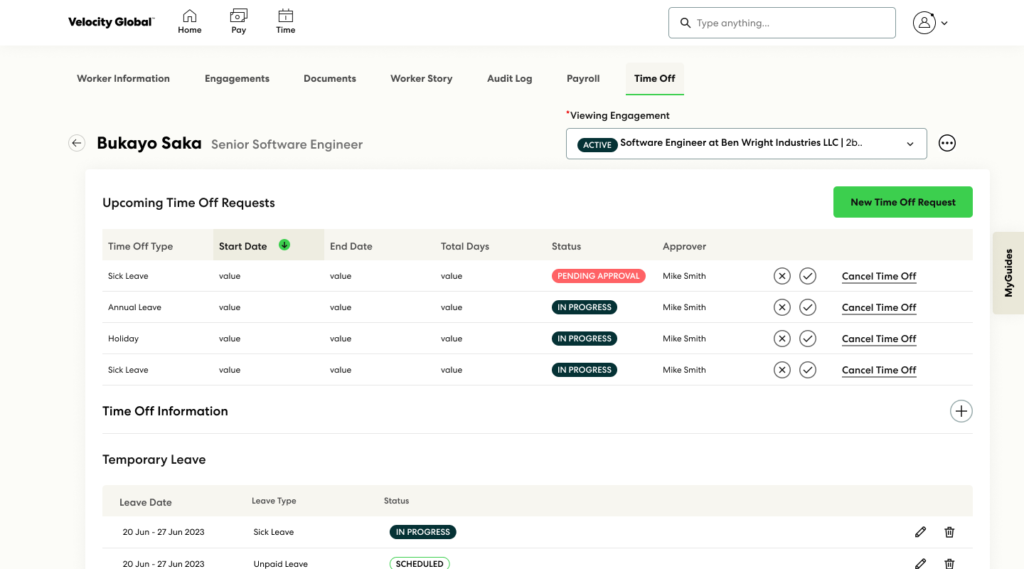
Safeguard Global – Best for Customizable Workforce Management
Safeguard Global blends EOR services with global payroll and contingent workforce solutions in 170+ countries. SaaS companies benefit from customizable employment models and advanced workforce data management tools alongside core EOR functions.
- Coverage in 170+ countries, with emphasis on complex workforce management needs.
- Offers both EOR and Global Managed Payroll solutions via a unified platform.
- Supports hybrid teams (employees + contractors), with focus on custom solutions and flexible employment terms.
Considerations: Enterprise focus may lead to longer onboarding cycles; less transparent standard pricing.
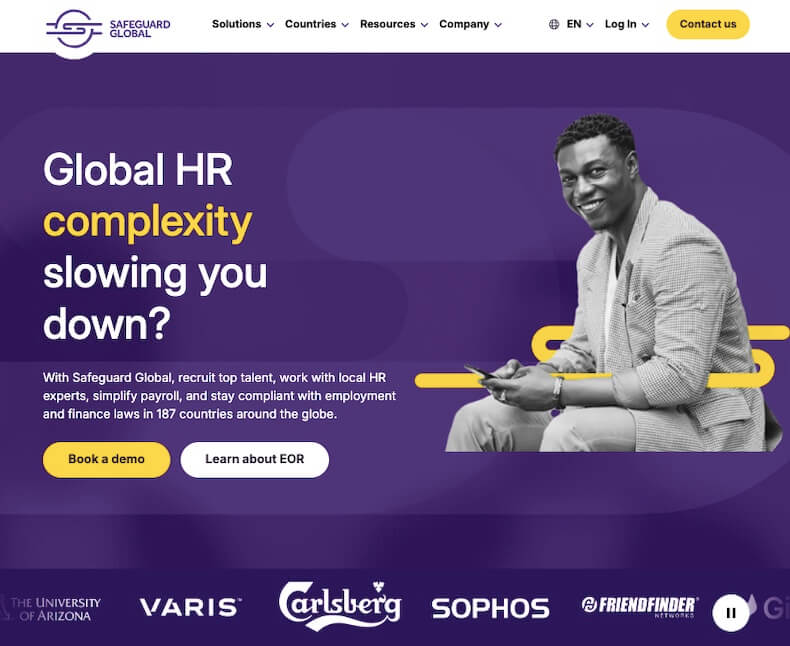
Quick Comparison Table
To help you assess platforms at a glance, the Quick Comparison Table distills essential information, like country coverage, ideal use cases, standout strengths, and limitations, into an easy-to-scan format.
Designed with clarity in mind, it highlights the most relevant criteria so you can zero in on what matters most to your SaaS business without getting lost in unnecessary detail.
| Provider | Coverage (Countries) | Ideal For | Strengths | Limitations |
|---|---|---|---|---|
| Deel | 150 | Fast-scaling, global SaaS teams | Broad compliance, crypto payments, equity support | Higher cost, support variance |
| Remote | 150+ | Compliance‑focused remote‑first teams | Transparent pricing, contractor flexibility | Limited high-touch legal advisory |
| Rippling | 50 | Teams needing a unified HR + IT stack | Automatic onboarding, device provisioning, modular UX | Narrower country reach |
| Globalization Partners | 180+ | Enterprise SaaS with complex scale | AI guidance (GIA), entity ownership, white-glove support | Premium costs may be over-provisioned |
| Oyster | 180 | Remote-first SaaS teams automating hires | Async workflows, fast contract generation, compliance lib | Limited legal/customs benefits support |
| Multiplier | 150 | Cost-sensitive SaaS startups in emerging markets | Rapid onboarding, transparency | Basic feature set; fewer integrations |
| Skuad | 160 | APAC/MENA/LATAM hiring | Local expertise, high ease‑of‑use, responsive support | Limited West/EU global focus |
| Papaya Global | 160 | Finance-driven SaaS firms | Payroll analytics, cross-border pay, treasury tools | More complex UX; higher entry cost |
| Velocity Global | 185+ | Flexible global scaling | Hybrid entity model, scalable onboarding, responsive support | Variable compliance control; customized pricing |
| Safeguard Global | 170+ | Customizable workforce management | EOR + payroll blend, hybrid workforce support, flexible models | Enterprise focus; longer onboarding cycles |
How Should SaaS Companies Choose An EOR?
To make the right choice, SaaS companies should begin by clarifying their international hiring plans, such as target markets, workforce types (contractors vs full-time), and launch timelines.
It’s equally important to evaluate each EOR’s country coverage, pricing transparency, compliance rigor, technology integrations, and support responsiveness to ensure cost-effective, worry-free expansion.
Step 1. Identify Your Expansion Strategy: Decide whether you’re hiring full-time employees, contractors, or both, and in which regions. That clarifies whether you need broader country coverage (like G‑P) or deep niche support (Multiplier, Skuad).
Step 2. Evaluate Platform Integrations: Check how well each EOR integrates with tools you already use: HRIS, accounting software (e.g., QuickBooks, Xero), finance tools, or your APIs.
Step 3. Compare Pricing and Contract Flexibility: Small teams may prefer fixed, transparent pricing (Remote, Multiplier). Scale-ups may benefit from platforms offering customised enterprise packages (Globalization Partners, Papaya).
Step 4. Assess Compliance and Support Quality: If you operate in tightly regulated industries (healthcare, finance), platforms with owned entities and AI guidance (Deel, G‑P) reduce risk. For startups, popular options like Oyster or Remote offer fast onboarding with adequate compliance.
Step 5. Consider Value-Added Features: Benefits administration, equity payroll, treasury services, analytics dashboards, and decide which extras matter most to your finance and HR operations. Papaya Global, Deel, and G‑P excel here.
Next Steps
- Define your priorities: employee vs contractor, regions, integrations, and compliance sensitivity.
- Pilot two options: start with complementary platforms (e.g., Remote + Deel or Paddy vs. Multiplier) to test UX and support.
- Engage early conversations with sales teams: understand your volume-based pricing options, SLAs, and onboarding timelines.
- Track onboarding and choose based on actual performance and responsiveness.
Frequently Asked Questions
Q1. What is an Employer of Record (EOR)?
An Employer of Record (EOR) is a service provider that legally employs workers on behalf of another company. The EOR handles payroll, taxes, benefits, compliance, employment contracts, and local labor regulations in the countries where the workers are hired. This allows businesses to hire internationally without establishing a legal entity in each country.
Q2. How do SaaS companies benefit from using EOR platforms?
SaaS companies benefit from EOR platforms by being able to hire global talent quickly and compliantly without setting up subsidiaries in multiple countries. EOR providers manage complex payroll, tax deductions, benefits administration, and local compliance.
This saves SaaS businesses time, reduces legal risk, and enables them to focus on product development and scaling operations.
Q3. Which EOR platform is best for startups?
For startups, platforms like Multiplier, Skuad, and Remote are often the best fit. They offer transparent pricing, fast onboarding, and user-friendly platforms without the high costs associated with enterprise-level providers.
Multiplier and Skuad also specialize in emerging markets, which can help startups access affordable talent pools.
Q4. What are the typical costs of using an EOR?
EOR pricing usually ranges between $400 to $700 USD per employee per month, depending on the country, service level, and provider. Some platforms charge a flat fee per employee, while others offer percentage-based fees tied to payroll amounts.
Additional costs may include foreign exchange (FX) fees, onboarding charges, or termination costs, so it’s important to review each provider’s pricing structure carefully.
Q5. Is it better to choose an EOR or set up a local entity?
Choosing between an EOR and setting up a local entity depends on your growth stage and hiring plans.
- EORs are ideal for fast, low-risk expansion into new markets without significant upfront investment.
- Setting up a local entity makes sense if you plan to hire large teams or have long-term operations in a specific country, as it can be more cost-efficient over time.
For most SaaS startups and mid-sized companies, using an EOR is the faster, more flexible option for global hiring.
Conclusion
Choosing the right Employer of Record platform can make or break your global hiring strategy. SaaS startups prioritizing cost-efficiency and emerging market access often prefer Multiplier or Skuad.
For compliance-heavy industries, Globalization Partners or Deel offer unmatched legal protection. If seamless integration across HR, IT, and payroll matters, Rippling excels.
Define your growth priorities, pilot top contenders, and choose based on real-world onboarding experience.
Need help shortlisting EOR options based on your SaaS team’s size, target regions, or hiring type? Contact us for a personalized recommendation.









